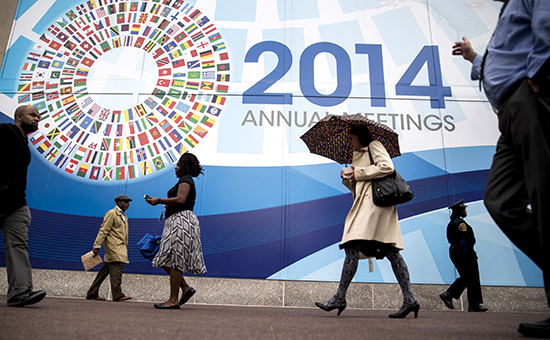
Photo: Fotobank / Getty Images
In Washington, October 10-12, will be the annual meeting of the International Monetary Fund and the World Bank. They were traditionally closely watched media, as these meetings on key issues of the global economy.
Autumn summit IMF and the World Bank will present hardly surprises. IMF discusses various ways to speed up the global economy over the past few years. Here and in the autumn of 2014 the main topics for discussion will be “a way out of a prolonged period of low economic growth, accelerating the economy and creating new jobs.” Declared subject is particularly relevant due to the recent decrease in the IMF’s forecast for global growth in 2015 from 4 to 3,8%.
As the meeting programs, head of the IMF and World Bank, October 10-12, participants include discussions about the importance of funding for economic development after 2015, food security under climate change, renewable energy sources. It is noteworthy that for three days, from October 10 to 12, the program only two events dedicated to Europe. One of them – a briefing by the IMF’s European Department, and the second – the discussion about reducing the debt burden of the European business. Discussion of regional issues will be focused primarily on Africa and Asia.
There will be no surprises in the political sphere. Which began in 2010, the reform of IMF governance, which aims to give more power to developing countries, especially China and Russia, is not complete. Head of Fund Christine Lagarde urged the United States (the largest donor of the IMF) will push through Congress the necessary amendments. However, as noted by The Financial Times, updated after the mid-term elections this year, the United States Congress can not agree with a reduction of American influence.
In a situation of predictable summit IMF and the World Bank more representative understanding of the world’s major economic trends will studies of these organizations. In this case, some of the findings of the IMF caused a stir in the media. It is, for example, that the Foundation has recognized the Chinese economy the largest in the world in terms of GDP converted to dollars at purchasing power parity. In 2014, China’s GDP in PPP terms to reach $ 17.6 trillion, while the corresponding figure in the United States is $ 17.4 trillion. This event is expected, but not so soon. The IMF thus noted the growing influence of China.
Among other important trends that are mentioned fund – post-crisis recovery of the United States and Great Britain. United States economy in 2014 will increase by 2.2%, and next year – by 3.1%. One of the reasons for strong growth, according to experts of the IMF – “shale revolution”. The United States has become the world’s largest producer of natural gas. Desheveyuschuyu fuel allows American industrial companies to increase their exports by an average of 6% per year.
the United Kingdom, along with Sweden and Switzerland will become the leaders in economic growth in Europe. All these states have in common is that they have kept the national currency in contrast to most of the EU countries that have adopted the euro.
The IMF forecast for the euro area is not so optimistic – Fund fears that the unit can slide back into recession. Lagarde to estimate the probability of such a scenario in the 35-40%. To avoid this, the European Central Bank recommended further loose monetary policy. As explained by Lagarde herself: “If the inflation outlook will remain unchanged, and the expectations are not improved, then the ECB should go ahead, including the direct purchase of government bonds.” This phrase is, in fact, a veiled recommendation led the ECB Mario Draghi to start a policy of “quantitative easing” for the eurozone. In the case of the ECB it still dare to, it would mean that the EU is moving in the opposite direction with respect to the United States and Britain, which are gradually scaling back their successful program of “quantitative easing».
In late September, a series of annual Geneva reports on the world economy, a report, “What is debt reduction?”. Geneva Reports on the state of the world economy produced jointly by the International Centre for currency and Banking Studies (ICMB) and the London-based Centre for Economic Policy Research (CERP). In it the main cause of all the economic difficulties recently was named a considerable debt – both public and private. It was he who hinders economic growth.
Fighting debt with the help of experts called ultrasoft monetary policy (sample here were the United States and the United Kingdom). In addition, the authors recommended that States take decisive steps in economics and finance and cooperate with each other.
Where less active media wrote about the IMF-supported reform of the rules of the issuance of government bonds and defaults on it. Fund said about his new position on October 6. So the IMF responded to the litigation in the United States, where demand from investment funds of Argentina fully repay its debt obligations, default of which was announced in 2002. The majority of creditors in 2005 agreed to a reduction in payments.
In this regard, the IMF offers to oblige the buyers of the bonds to agree to a scheme in which they are in case of default and debt restructuring undertake to implement the decisions taken by 75% of creditors . Formally, the new rules of the bond issue should take the states themselves, but the IMF has said it will promote innovation.
No comments:
Post a Comment